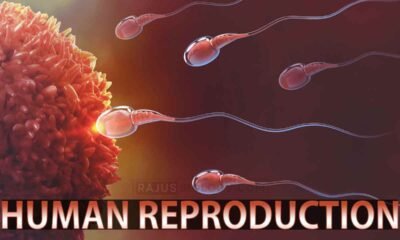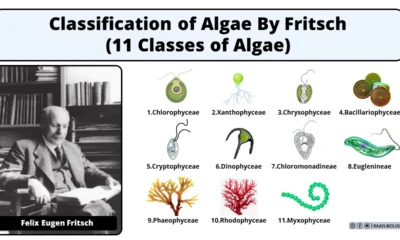Blog
5 Examples of Echinoderms | Free Biology Notes

After reading this article you will learn about Examples of Echinoderms
Examples of Echinoderms
Asterias (Star Fish)
- Commonly known by star fishes or sea stars
- They are star shaped and distributed in all the oceans
- The aboral surface bears many spines distributed irregularly
- Two arms having madreporite between their bases are called bivium and the other three arms as a trivium
- It possesses great power of regeneration and shows autotomy
Ophiura (Brittle Star)
- Ophiura Commonly called Brittle star and usually lives in bottom of sea
- The body of Ophiura consists of a star- shaped disc and five highly flexible arms
- The water vascular system is almost similar to that of Asterias
- There is no special sense organ in Ophiura. The tube-feet are sensory in function.
- The sexes are separate and sexual dimorphism is absent.
Cucumaria (Sea Cucumber)
- It is commonly known as sea cucumber lives in shallow waters of the ocean
- Body elongated, cylindrical, swollen in the middle and narrow at two ends.
- The mouth and anus (cloaca) are situated at opposite ends.
- The spines are absent but small calcareous particles are found embedded in the body wall.
- Madreporite is internal and the respiratory organ is respiratory tree
- Evisceration is a method of autotomy involving the ejection of internal organs used for defensive strategy.
- Sexes are separate and development through auricularia larva
Echinus (Sea Urchin)
- It is commonly known as sea urchin and live in shallow water in both rocky and sandy place in sea.
- Body is Sub-globular and convex or dome-shaped above and flattened below.
- Body is covered over with long, strong, sharp, solid and movable spines
- Aristotle’s lantern is mouth part of sea urchine used for mastication
- Sexes are separate. Development includes Echinopluteus larva.
Antedon (Sea Lily)
- Commonly known as sea feather or sea lily and is found in shallow waters attached to rocks or stones
- Body comprises a small central disc and 5 branched radial arms
- The central disc has a distinct oral and aboral surface
- It has greater power of regeneration
- Sexes are separate and development includes a Crinoid larva

 Blog7 months ago
Blog7 months ago[PPT] Human Reproduction Class 12 Notes
- Blog7 months ago
PG TRB Botany Study Material PDF Free Download
- Blog7 months ago
Contribution of Indian Phycologists (4 Famous Algologist)

 Blog7 months ago
Blog7 months agoCell The Unit of Life Complete Notes | Class 11 & NEET Free Notes

 Blog7 months ago
Blog7 months ago[PPT] The living world Class 11 Notes

 Blog7 months ago
Blog7 months agoJulus General Characteristics | Free Biology Notes

 Blog7 months ago
Blog7 months agoClassification of Algae By Fritsch (11 Classes of Algae)
- Blog7 months ago
Class 12 Biology Notes Chapter wise PPT












